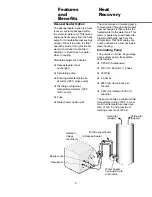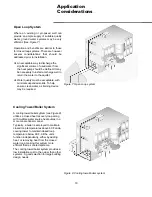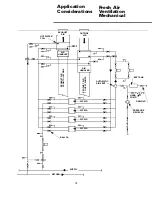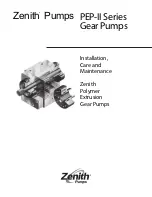
16
Well Water
Systems
Application
Considerations
7
6
2
3
4
5
Figure 11: Well water installation
1
9
8
Su
pp
ly
Ov
erf
low
Re
tur
n
General
A well water application involves an
open loop water supply. The water
is drawn from an open well or pond
into the unit. A straining device is
required with this application.
Similar to the closed loop design,
an open water supply usually
remains at a constant temperature
year round utilizing maximum
efficiency in unit design.
See Figure 11 for open well water
installation.
Well Water
Application
Ball valves should be installed
in the supply and return lines
for unit isolation and unit water
flow rate balancing (if auto-
matic flow device is not
selected). This connection,
along with hoses, are also rec-
ommended for backflushing
and chemical cleaning of the
evaporator and the condenser.
Flexible hoses may be used to
connect the water supply and
return lines to the water inlets
and outlets. These hoses
reduce possible vibration
between the unit and the rigid
system.
Note: Hoses and or pipes
should be braided stainless
steel, and sized suitable for the
system’s water pressure and
flow rate.
Load side connections are
used to supply the terminal
device.
The sound attenuation pad
should be slightly oversized for
the unit. This field supplied
product is recommended for
sound absorption of unit.
The low voltage control con-
nection provided on the unit is
large enough for attaching con-
duit.
The expansion tank should be
sized to maintain pressure on
the system.
The line voltage disconnect
should be installed for branch
circuit protection. The unit is
supplied with an opening for
attaching conduit.
The water regulating valve
assembly is used to maintain
refrigerant pressure in refriger-
ant circuit as the entering water
temperature varies or is cooler
than ideal.
Schrader connections are
factory installed for ease of
attaching the water regulating
valve assembly.



































